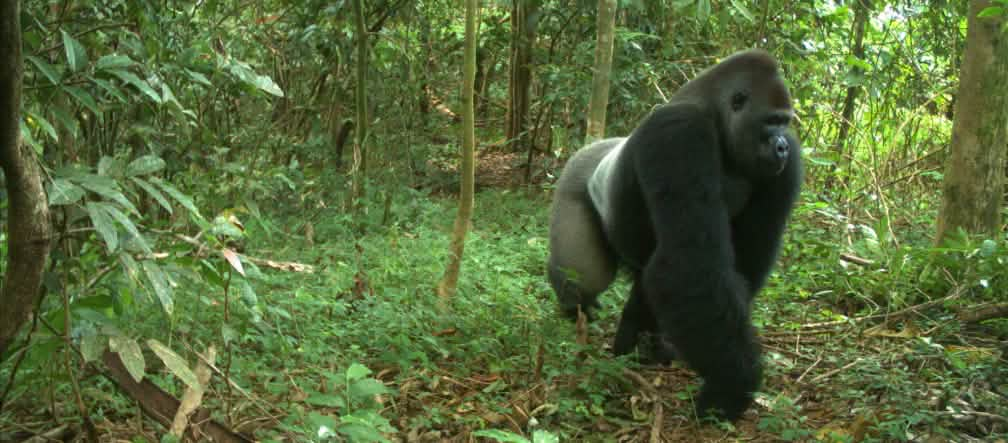
Completed campaign
Nigeria: keep cocoa growers out of gorilla habitat!
Gorilla habitat is shrinking day by day, and one of the main drivers is the chocolate industry. In Nigeria, cocoa farms are penetrating the last refuges of the endangered primates, driven by demand from chocolate lovers the world over. We can’t let the last remaining tiny patches of gorillas’ forests be trashed for candy.
To: Governor Bassey Otu, via the Cross River State Forestry Commission (Mr Ogbang Akwaji)
“Cocoa plantations are endangering the last rainforests in Cross River State. Strengthen nature conservation and fight illegal deforestation by cocoa producers.”Nigeria gives rise to despair and small glimmers of hope: 96 percent of the country's forests are gone. One remaining bright spot is Cross River State in the southeast – its forests, which are among the world’s most biodiverse, are still home to gorillas.
Yet Cross River’s forests are also dying by a thousand cuts: More than 16,000 hectares were destroyed in 2017 – four times the previous year’s toll. The main causes of deforestation are illegal logging, palm oil plantations and the production of charcoal. Increasingly, cocoa plantations are encroaching on protected forests.
The ultimate driver of destruction, however, is the sweet tooth of consumers in the global North. Nigeria is the third-largest cocoa exporter in the world. The country is responsible for ten percent of the EU’s imports. Exports have grown by 65 percent over the past three years to 248,000 tons in 2018, with the Netherlands, Germany and Belgium being the largest importers.
In Côte d’Ivoire and Ghana – the world leaders in cocoa production – the destruction of forests has reached extreme proportions. Nearly all of Côte d’Ivoire’s protected areas have been plundered, and Ghana holds a sad world record for its rate of deforestation in 2018. The close link between cocoa cultivation and deforestation makes us fear the worst for Nigeria.
Chocolate companies buy whatever cocoa they can get, no questions asked. While environmentalists in Brussels are in fact pushing for the EU to regulate the market, the gorillas can’t wait that long.
The governor of Cross River State, Bassey Otu, has it in his hands to protect the gorillas and their habitat. Please sign our petition to the governor – we can’t let the last remaining tiny patches of gorilla habitat be trashed for candy.
Cross River State is already taking first steps toward preventing further deforestation for cocoa. The Wildlife Conservation Society (WCS) is currently expanding an ongoing project to villages in Afi, Mbe and Okwangwo. Its aim is to produce cocoa in an environmentally sound way. The EU is supporting the project financially.
The state government is planning a cocoa processing plant in the city of Ikom. The impact that this will have on the expansion of the plantations is currently unclear.
Cocoa in Omo Forest Reserve
Cocoa plantations are also a problem in Omo Forest Reserve. Thousands of smallholders have planted fields in the protected area in the state of Ogun. The reserve is home to at least 80 forest elephants and a crucial source of drinking water for the Nigerian metropolis of Lagos. Some settlers have already been there for decades, and the government would rather not evict them, as it would destroy their livelihoods and compensating them would be very costly. Rangers patrol the forest to stop others from encroaching, but the ranger units are too understaffed to protect the forest effectively.
To: Governor Bassey Otu, via the Cross River State Forestry Commission (Mr Ogbang Akwaji)
Your Excellency,
Rainforest Rescue is a nonprofit organization based in Hamburg, Germany. We are dedicated to preserving rainforests, protecting their inhabitants and furthering social reform.
Cross River State brings Nigeria – a country which has already lost 96 percent of its forest cover – to prominence in global discussions on the environment because it is home to some of the most biodiverse forests of Nigeria, and habitat of endangered species such as gorillas, chimpanzees and forest elephants.
It is therefore very worrisome that in Afi River Forest Reserve – a biodiversity hotspot – forest is being cut illegally for the production of cocoa. The reasons for this are manifold, amongst them the search for alternative livelihoods to replace logging for timber by local communities and a lack of knowledge about sustainable cocoa farming systems. We also observe that law enforcement within the protected areas seems ineffective.
To prevent further destruction, we call on you to implement the following measures:
1. Strengthen the protection and management of forests in Cross River State in collaboration with local communities.
2. Educate small-scale cocoa farmers in sustainable cocoa farming systems.
Yours faithfully,

